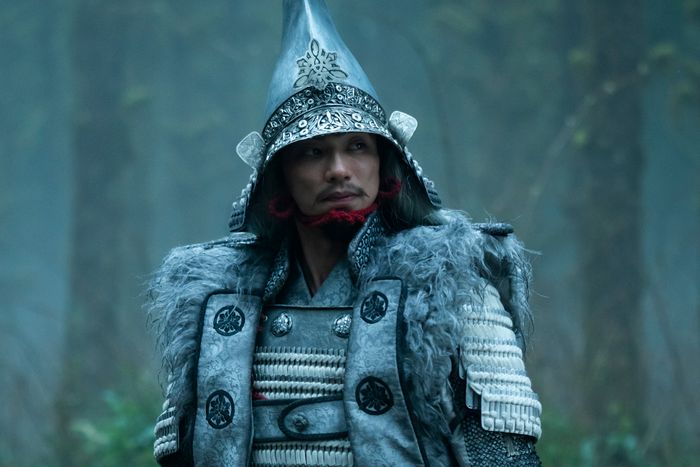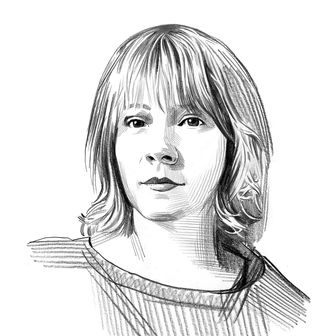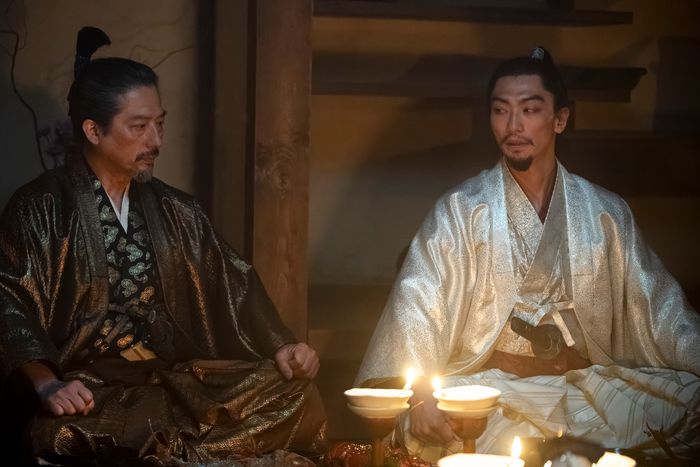
When he rides into Shōgun episode seven, Saeki Nobutatsu shakes up Lord Toranaga’s plans almost as badly as that earthquake. Rather than bailing out his half-brother, Saeki reveals he’s joined the council of regents: Toranaga (played by Hiroyuki Sanada) is to surrender to the regents, and his son Nagakado is to commit seppuku in retribution for the attack on Ishido’s men. The newly arrived Saeki almost seems to relish this turn of events, stroking his beard often in a way that seems outwardly villainous. But Eita Okuno, who plays Saeki, sees this reversal of fortunes as payback for stealing his “mother’s milk.” Everything about the character — from his flamboyant helmet to his luxurious long hair — stems from his inferiority complex regarding his brother. With Saeki now sitting on the council in the series’ penultimate episode, the tables have finally turned.
In reality, Okuno has some of the awe for Sanada that Saeki has for Toranaga. Okuno even picked which acting school to attend in part based on Sanada’s career. “Sanada-san is already a Toranaga in so many ways,” he said via translator. “Just standing opposite him makes my leg shake a little bit.”
Shōgun is based in history, loosely, and your character doesn’t have much of a historical record. Is it challenging to not have as much information, or is it freeing to create your own guy?
Eita Okuno: I wasn’t so bound to the historical figure. I understand that this person existed, but it was so much more about the character that is created for this specific show. When I went to the sets, a great deal of work had already been done by the costume team, hair team, the entire crew, to create Saeki. I felt that what I should be doing was to ride that image that had been collectively created.
Let’s talk about the costumes. When your character comes into the show, he almost blends in with the fog that is surrounding him. His whole crew is in silver. And he has this very striking helmet. What was your favorite little detail of your outfit that helped inform your performance?
The costumes were designed by Carlos Rosario, and his design for Saeki’s armor is quite flamboyant. What you would expect, when somebody is in the presence of someone like Toranaga, is for them to be humble. But instead, they decided to focus on Saeki’s insecurity and the ego, his need to present in a strong way. So Carlos really focused on Saeki’s inferiority complex.
His older brother is always many steps ahead of him, and he feels a deeply rooted need to impress him. So in contrast to Toranaga’s armor — which is very warm and elegant and down to earth — Saeki’s armor is silver and very flamboyant and flashy. It’s as if he’s floating in the air. That really helped explain his deep inner thoughts.
How did you find that sibling rivalry; how do you create decades of backstory out of thin air?
It’s quite easy, because Sanada-san is already Toranaga in so many ways. You can’t know what he’s thinking, but you know that he’s in the middle of everything. And just standing opposite him makes my leg shake a little bit.
Sanada-san is somebody that I’ve always admired and respected. In fact, I chose my university partly because he went there. So there’s that sort of underlying private feelings, personal feelings. I have this overwhelming urge and need to be able to stand opposite him and not be sort of eaten away. That really informed my performance.
Realistically, Toranaga and Saeki would likely not have spent that much time together. They probably haven’t seen each other for over a decade. It is likely that they’ve heard about each other’s events and accomplishments, and Saeki probably has a great deal of jealousy. Saeki’s very conscious of what his older brother has that he doesn’t have. So episode seven is this moment when he might be able to succeed against his brother for the first time.
It seems like Saeki is leaning into the perceived villainy of his actions. I wonder if he feels the betrayal of what he’s doing or whether it’s all just business to him. Or if he’s just unconflicted and happy about getting one over on his brother.
Certainly the audience is free to take away what they see, but personally, Saeki definitely has this underlying personal desire to best his brother.
That brings up the question that I think gets asked in every interview about Shōgun: What has working on the show done to your relationship with communication and with language?
What was great, and very different from my past experience, is that each crew and each department had a very sharp sense of their responsibility. They were always open for communication and up for trying new things. I felt encouraged to speak up.
Can you give me an example of a time on set when speaking up elevated the final product?
My hair. It’s this long ponytail. He’s sohatsu, so he doesn’t have this middle part shaved as most of the samurais do. His ponytail, it’s long. The direction that was given to the hair department, and what they had in mind initially, was based on the idea that Saeki is wild. Most Americans’ concept of “wild” is more disheveled. But it didn’t feel right. It didn’t feel authentic. My idea was to go with the hairstyle we ended up with. Considering the time period, that hairstyle was considered very avant-garde, wild and crazy. So it is something that fits the culture and time period yet delivers that distinction.
In a typical Japanese film set, my experience is not being able to have this level of participation and conversation on something so big. So it was really great to be able to be part of the process. Sanada-san created a great level of communication and collaboration. That was fundamental.
Of all of the people in this aristocratic class, Saeki seems like the one who’s the most pessimistic about his situation. Jaundiced, even. What do you think has given him this outlook?
He wants to get his brother into trouble. That’s his biggest drive. He feels Toranaga took away his mother in certain ways. He took his mother’s milk. Realistically, he was probably the younger brother, but you get it. Most likely their mother was more interested in Toranaga. Which triggered the inferiority complex.
But he extends that resentment to the whole lifestyle. His line when his nephew is bleeding out, “Where is the beauty in this?”, seems more philosophical. But it sounds like that all stems from that lack of familial connection.
During the Sengoku period, it’s a time of constant war. You don’t know what will happen tomorrow. So it really is about living the time that you have. Everybody, including Saeki, would have that concept very, very much present in their mind all the time. I don’t know if it came across, but I feel that the last line also refers to Nagakado’s very ephemeral life. There is that bittersweet sadness in seeing Nagakado’s short-lived life fading away in front of him.
Speaking of iconic lines, tell me what was it was like reading that the line about trying to fuck a sunset. What insight did that give you into your character?
As you probably noticed, Saeki does make a lot of these dramatic and poetic expressions. I think there was a line about … I forgot the English subtitle, but, “Death is a lonely walk in the forest,” or something like that. There’s several like that. Saeki is the kind of person who tends to collect these expressions. And also probably back in those days, those types of expressions were more appreciated than today. It is something that you would say in front of people and it would be quite appreciated. But also, it’s very much who Saeki is, in that he sees life and he gives words to it and he layers it. It’s like he’s keeping a diary.
But also that line speaks to the way Saeki violates a lot of laws of decorum. As you said, with his hair, then the story he tells at dinner, he’s very disruptive. Is that fun, to play somebody who shakes everything up?
Yeah, it’s certainly a lot of fun. A lord of that stature does know what is required, does know what behavior and courtesy are required. He’s violating that knowingly. There’s the basic understanding, and he knows it, and he’s breaking it, and that’s a lot of fun to do.
Yeah, even before he pulls out the regents’ order, his demeanor toward his brother lets you know where he stands.
When I get to the banquet.
We already know. This show is so much about loyalty. It’s made me reexamine my allegiance, personally. To whom or what are you loyal?Personally?
Yeah, personally.
I fear I might be a little superficial in that regard, because I am always hungry for something that is interesting. It’s a very tricky question. It’s not like money can buy my loyalty. It’s not blood ties. Family is important, but it’s not like my parents are the most important thing. I’m not planning to betray anyone. But having said that, it’s always fun to betray the audience’s expectations. So perhaps it could be said that I’m loyal to my independence.
A loyalty to following your own spirit. That just made me think of Polonius’s line in Hamlet, “To thine own self be true.” As the Claudius of Shōgun, after almost getting killed by your nephew, did you think at all about that story of Hamlet? Or even The Lion King?
Yes, it’s very interesting in terms of these classical plays. There is certainly a great deal of universality to this story that speaks to people from around the world at different time periods. Perhaps in modern stories, it is more difficult to so clearly tell a story of bloodlines and injustice and all that.
Let me know if you feel any different about Scar after playing Saeki.
Yeah, there’s sadness to the story of Scar.
This interview has been edited and condensed for clarity.



